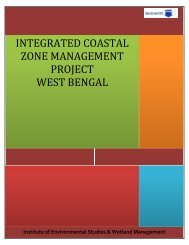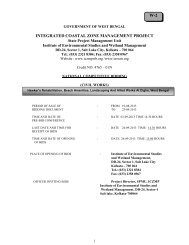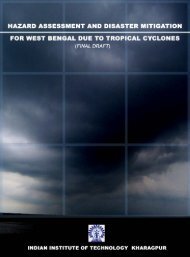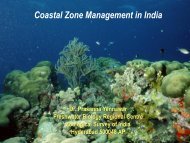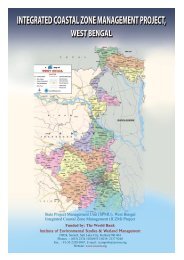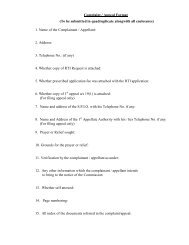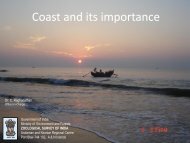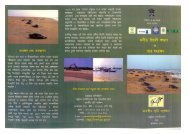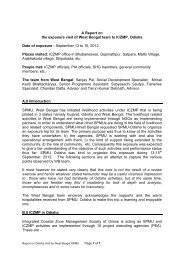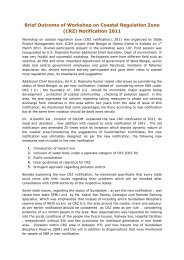INDIA: Integrated Coastal Zone Management Project
INDIA: Integrated Coastal Zone Management Project
INDIA: Integrated Coastal Zone Management Project
You also want an ePaper? Increase the reach of your titles
YUMPU automatically turns print PDFs into web optimized ePapers that Google loves.
<strong>INDIA</strong> <strong>Integrated</strong> <strong>Coastal</strong> <strong>Zone</strong> <strong>Management</strong> <strong>Project</strong> (P007985)<br />
C. Achievement of Development Objectives<br />
6. The <strong>Project</strong> Development Objectives are to assist GOI in (i) building national capacity for<br />
implementation of comprehensive coastal management approach in the country, and (ii) piloting the<br />
integrated coastal zone management approach in states of Gujarat, Odisha and West Bengal.<br />
7. Substantial progress has been made with respect to building the national capacity for implementation of<br />
comprehensive coastal management approach in the country. The most notable include the following.<br />
8. Policy and regulatory changes: In January 2011, the CRZ Notification 2011 became formally effective,<br />
and replaced the CRZ Notification 1991. In addition, for the very first time, an Island Protection <strong>Zone</strong><br />
Notification, 2011 was notified covering Andaman and Nicobar Islands and Lakshadweep Islands. Both<br />
these new Notifications, under the Environment (Protection) Act, 1986, reconcile three objectives: (i)<br />
protection of livelihood of traditional fisher communities: (ii) preservation of coastal ecology; and (iii)<br />
promotion of economic activities that have necessarily to be located in the coastal regions. These<br />
notifications also provide the legal basis for the “appropriate national institutional structure for guiding<br />
and coordinating implementation of ICZM approaches” – the most important PDO indicator. The public<br />
engagement (more than 100,000 people took active part in the consultations and written submissions,<br />
specifically over last 18 months) and consensus building processes led by the MOEF/SICOM was<br />
comprehensive, well conceived and executed, and should be considered a best practice, especially in light<br />
of the complexities of issues influencing lives of nearly 250 million people.<br />
9. Separately, under the Environment Protection Act, 1986, MOEF has enacted the Dandi Eco-Sentive Area<br />
Notification in pursuance of the <strong>Project</strong>’s focus on conservation of ecologically sensitive areas (ESAs),<br />
and enhancement of livelihood of local communities dependent on these ESAs. This notification had been<br />
finalized based on agreements of the 6 village Panchayats, the Government of Gujarat. Discussions on<br />
similar notifications for the Gulf of Kachchh (in Gujarat) and Vedaranyam (in Tamil Nadu) have<br />
progressed substantially; and have been initiated for Vembanad (in Kerala). The MOEF has also<br />
announced policies for moratorium on development on the coastal area which are subject to severe<br />
erosion (based on analytical work described in paragraph 12 below).<br />
10. Augmenting institutional capacity: The National <strong>Coastal</strong> <strong>Zone</strong> <strong>Management</strong> Authority (NCZMA), and<br />
the State <strong>Coastal</strong> <strong>Zone</strong> <strong>Management</strong> Authorities (SCZMAs) have been reorganized; and formation of<br />
District Level <strong>Coastal</strong> <strong>Zone</strong> <strong>Management</strong> Authorities (DCZMAs) has been initiated. MOEF has mandated<br />
the Society for <strong>Integrated</strong> <strong>Coastal</strong> <strong>Management</strong> or SICOM (which is the national project management<br />
unit) to be responsible on behalf of MOEF, to (i) coordinate all conservation and community livelihood<br />
programs for integrated management of the coastal and marine areas; and (ii) coordinate all program for<br />
conservation and sustainable development of marine biodiversity of the country. The Government of<br />
Odisha has mandated the <strong>Integrated</strong> <strong>Coastal</strong> <strong>Zone</strong> <strong>Management</strong> Society of Odisha (which is the SPMU) to<br />
be the secretariat of the Odisha SCZMA. The National Centre for Sustainable <strong>Coastal</strong> <strong>Management</strong><br />
(NCSCM) has been established in Chennai; and recruitment of initial batch of about 60 staff is underway.<br />
The NCSCM has been established in partnership with Anna University; and until facilities for the new<br />
NCSCM are ready, the Anna University has agreed to provide all accommodation, buildings and<br />
facilities. SICOM has facilitated, through a declaration signed by all concerned, a tie up of 14 institutes<br />
across the coastal States and Union Territories with NCSCM. NCSCM has already prepared a work<br />
program for the first two years of its operation. Draft Memorandum of understanding, and draft joint<br />
project agreements have been prepared to set up medium term partnership between national<br />
Oceanographic and Atmospheric Administration (NOAA) of USA and NCSCM.<br />
11. Improving knowledge base: SICOM, through the Institute of Ocean management, Anna University,<br />
Chennai has started preparation of shoreline change maps (1972-2010) for the entire country. Wherever<br />
shoreline erosion is severe, MOEF has directed that no new development projects or activities can take<br />
3




